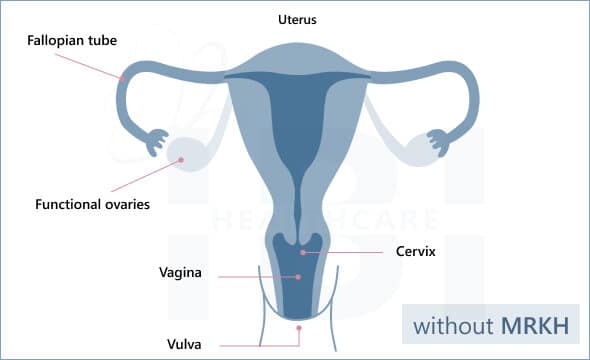MRKH Neovagina Overview
Understand the surgical techniques and approaches used in neovagina creation as part of MRKH treatment, offering insights into the procedures.
Learning that you have a rare disorder of the reproductive system can turn your world upside down, especially if you are only a teenager when you receive this news. “Mayer-Rokitansky-Küster-Hauser Syndrome” or MRKH is a disorder that affects 1 in 5,000 women and can also affect other internal organs, skeletal development, and hearing. Additionally, it causes emotional distress. Treatment for MRKH may include vaginal fistula repair by an expert reconstructive surgeon.
What is Mayer Rokitansky Küster Hauser – MRKH?
Mayer-Rokitansky-Küster-Hauser (MRKH) Syndrome is a rare disorder that affects approximately 1 out of 5000 females each year. The disorder affects the female reproductive system and is tricky to diagnose at first. MRKH disease causes underdevelopment or absence of the uterus and/or vagina, but individuals affected by it still have normal genitalia, properly functioning ovaries and female chromosomes.
All may appear normal including the onset of pubic hair growth and developing breasts as they reach puberty with the disorder normally diagnosed when the menstrual cycle remains absent. Historically, experts thought of this disorder as a random birth defect, but as more research takes place, they are almost certain that it is genetic and involves a dominant gene. Any parent that is carrying this dominant gene has a 50% chance of passing it on to their child.
Comparing MRKH Syndrome Reproductive vs Normal Organs


How Do They Diagnose Mayer-Rokitansky-Küster-Hauser Syndrome?
Doctors typically initiate the MRKH diagnosis when a teenager fails to begin menstruating.
The doctor will normally begin by performing a physical exam and check for signs of the disorder which include a shortened vagina and then order an ultrasound or MRI imaging tests to determine the advancement of the disorder. In some cases, the kidneys and other organs may also be affected. Doctors typically order blood tests to check hormone levels.
Teens diagnosed with MRKH syndrome typically experience identity issues and increased emotional distress at this already sensitive time in their lives which leads to depression. Available treatments and emotional therapy should be explored as soon as possible.
If doctors discover that an individual lacks a vaginal canal or has an abnormally short one that would make normal functionality, such as during sexual intercourse, an issue, then they should consider Neovagina surgery. It is a safe and effective procedure that might be an option for them that would restore sexual function.
What is Neovagina Surgical Procedure?
Neovagina is a surgical procedure that creates a vaginal canal for patients who suffer from MRKH. Numerous surgical techniques are available to create a neovagina to help those with MRKH:
McIndoe Procedure
The McIndoe procedure creates a neovagina using a skin graft (generally from the buttocks). This procedure can carry a week of downtime to ensure that the MRKH neovagina heals properly.
Williams Procedure
This involves the creation of a vaginal pouch from the labia minora. The resulting neovagina is too small to engage in sexual intercourse without pain or injury. Surgeons have made several modifications to this procedure to create a deeper pouch, but it is normally only used if other surgical procedures are no longer an option.
Bowel Vagina
This is considered a major operation that involves using a section of the bowel to create the neovagina. The recovery from bowel vagina surgery can extend up to 6 weeks in some cases.
Laparoscopy-Vecchietti Procedure
This procedure requires the usage of dilators and a surgical procedure. It involves placing a traction device outside the abdomen. A small bead is placed inside the vagina, and then pressure is continually applied over the next 7-10 days to form the vaginal cavity.
Davydov Procedure
This procedure involves the use of your peritoneal lining (the membrane that lines the abdomen). A surgeon makes an incision where they are going to form the vaginal canal. Then, the surgeon makes another incision near the belly button. The surgeon then stitches the peritoneal lining to create the vaginal opening and canal. Patients must use dilators for a short time after surgery. Surgeons often perform this surgery laparoscopically, using small incisions and a minimally invasive approach.

Where to find MRKH Neovagina Treatments?
Many state-of-the-art surgical centers offer MRKH neovagina surgery. Make sure you look for highly skilled surgeons. As well as have extensively trained surgeons in plastic and reconstructive vaginal procedures. Furthermore, highly expert cosmetic surgeons who have years of experience in performing vaginoplasty. Moreover, if you think you are a good candidate for MRKH surgery. Set up a consultation to avoid further complications.
Nonetheless, learn more about our Advanced GYN Center for women’s reproductive health procedures.











